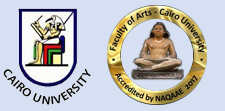عنوان المقال عربي
الأصول اليونانية لنظرية الكُمُون عند النَّظَّام
Document Type
Original Study
Subject Area
Humanities and Social Sciences
Keywords English
Keywords: Immanence، Annazzam، The Stoics، Potentiality، Actuality
كلمات مفتاحية عربي
الكلمات المفتاحية: الكُمُون، النَّظَّام، الرواقيين، القوة، الفعل
Abstract English
AbstractThis study deals with the Greek origins in Annazzam's immanence theory that is a form of the creation of the world known to Islamic thought. Annazzam is considered the most prominent thinker with whom this theory is associated, being pivotal to his divine, natural, and human thought. In other words, the paper is an attempt to examine Annazzam's immanence theory to the extent that shows its Greek origins.The paper tackles three main elements, first: Annazzam's immanence and divinities (the influence of Aristotle's theory of potentiality and actuality),second: Annazzam's immanence and naturalism (the influence of the Stoics' view of the absolute overlap), third: Annazzam's immanence in human matters (the influence of Greek philosophers such as Democritus, Epicurus and Plato). The study concludes that there are Greek origins for Annazzam's Immanence theory--Annazzam benefitted from Greek philosophy, but he engrained his thought differently--which shows that immanence is closely related to monotheism.
الملخص العربي
المستخلص:يتناول هذا البحث" الأصول اليونانية لنظرية الكُمُون عند النَّظَّام"، وتُعد نظرية الكُمُون شكلًا من أشكال خلق العالم التي عرفها الفكر الإسلامي، ويُعدُّ النَّظَّام المفكر الأبرز التي ارتبطت به هذه النظرية، فلا يُذكَر الكُمُون في الفكر الإسلامي إلا ويذكر معه النَّظَّام؛ لجعله الكُمُون النظرية الرئيسة والمحورية لمذهبه في البحوث الإلهية، وكذلك الطبيعية، والإنسانية، ويركز البحث على عرض نظرية الكُمُون عند النَّظَّام بالقدر الذي يظهر أصولها اليونانية.وقد قسَّمتُ البحث إلى ثلاثة عناصر، تناول العنصر الأول" الكُمُون والإلهيات عند النَّظَّام"؛ إذ إنه تأثر في قوله بالكُمُون في الإلهيات بنظرية الوجود بالقوة وبالفعل عند أرسطو، وتناول العنصر الثاني" الكُمُون والطبيعيات عنده"؛ إذ يقترب النَّظَّام في حديثه عن الكُمُون في الطبيعيات من مادية الرواقيين وخاصة قولهم في التداخل المطلق، أما العنصر الثالث" الكُمُون في المسائل الإنسانية"، وتأثر فيه النَّظَّام بعدد من مذاهب الفلاسفة اليونانيين أمثال ديموقريطس وأبيقور وأفلاطون، وتوصل الباحث في نهاية بحثه إلى أن هناك أصول يونانية لنظرية الكُمُون التي قال بها النَّظَّام؛ إذ إنه استفاد من الفلسفة اليونانية، ولكنه صبغ فكرته بروح تغاير ما كانت عليه عند السابقين؛ فارتبط الكمون عنده بأصل التوحيد.
Recommended Citation
Mertah, Ahmed
(2024)
"Greek Origins in Annazzam's Immanence Theory,"
Journal of the Faculty of Arts (JFA): Vol. 84:
Iss.
1, Article 6.
DOI: https://doi.org/10.21608/jarts.2023.201969.1345
Digital Object Identifier (DOI)
10.21608/jarts.2023.201969.1345
Accept Date
2023-05-24
Publication Date
1-1-2024

